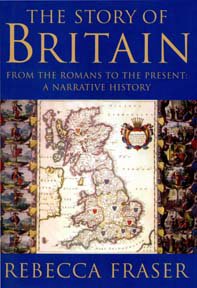Wednesday, January 11, 2006
Book Review: The Story of Britain
 The author of this book, Rebecca Fraser, is the daughter of Antonia Fraser something I did not know when I started and I read to regret.
The author of this book, Rebecca Fraser, is the daughter of Antonia Fraser something I did not know when I started and I read to regret.I like narrative history as a genre, and I particularly like them when it comes to Great Britian, the sweeping story of that nation is grand, and quite illuminating to American history as well. But now I have found one I did not care for much at all.
The Story of Britain: From the Romans to the Present A Narrative History is too polemic to be of any genuine value as history.
This is hardly the first such history of Great Britain I have ever read, so I have some basis of comparison. I have two primary critiques of it. The first is that it is not really a british history, it is an english one. Wales and Scotland are barely mentioned save to acknowledge the fact that they once existed, were occassional military enemies, and eventually absorbed. It is as if those two nations made no contribution whatsoever to the cultural development of Great Britain as a whole. I find this terribly myopic, particular when it comes to democracy which flowed as much from Scotland as it did arise spontaneously in England.
But my major critique occurs with the author's handling of the 20th century, particularly the administrations of Churchill and Thatcher. WWII is treated almost as a trifle, a diversion somehow from the "true path" of development, as was the Thatcher administration. While the necessary plaudits are handed to Churchill, one feels as if they are given only grudgingly and as rapidly as possible, as if to reduce the author's pain.
It is with the Thatcher government that the knives come competely out of their sheath, however. One reads the pages devoted to this period all the while knowing one is being set up for the big..."but." Even when reading about the current Blair government the author cannot resist a final parting shot at Thathcher within the last two pages of the book.
What happens is that eseentially the book is pretty standard until the 19th century. Then as the rule of royalty is replaced by the party politics of Parliment, the book degenerates into a political diatribe, with the formation of the Labour party presented as perhaps the preeminent occurance in the entire history of the nation. By the end, the book has ceased all pretense at historical objectivity and become simply a pro-Labour pamphlet with the occassional barb in the side of the Tories.
Narrative histories, by their nature, will always have a point of view. But when they slide past such into actual arguement for a particular political party or viewpoint, in this reviewers opinion, they sacrifice the right to call themselves "history" at all. Such is the case with this book - it should be filed in the political section, not the historical one.





